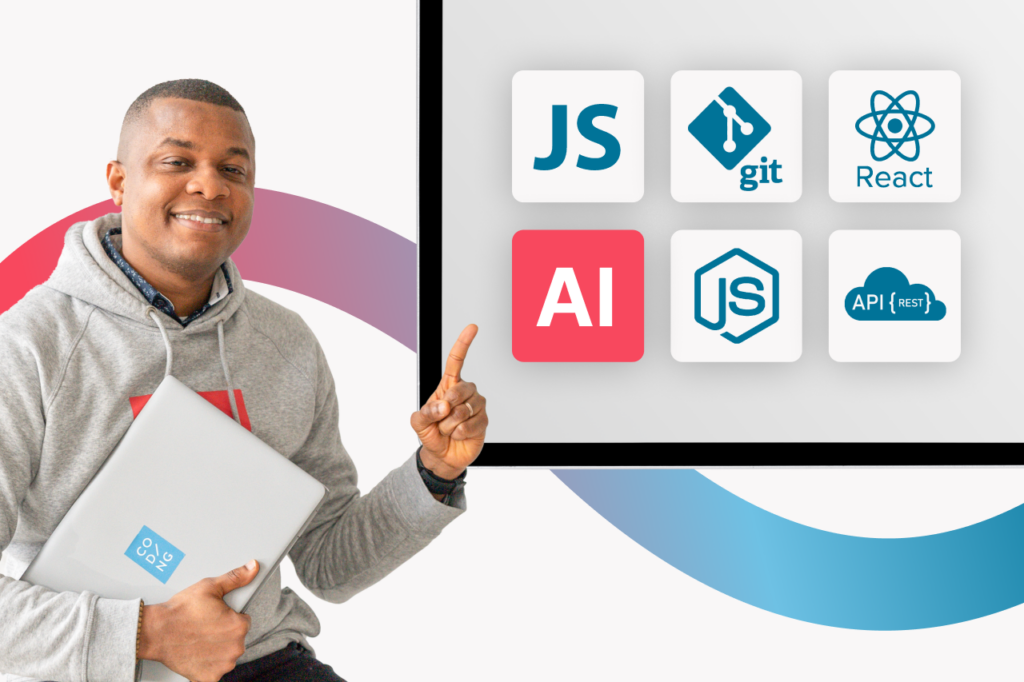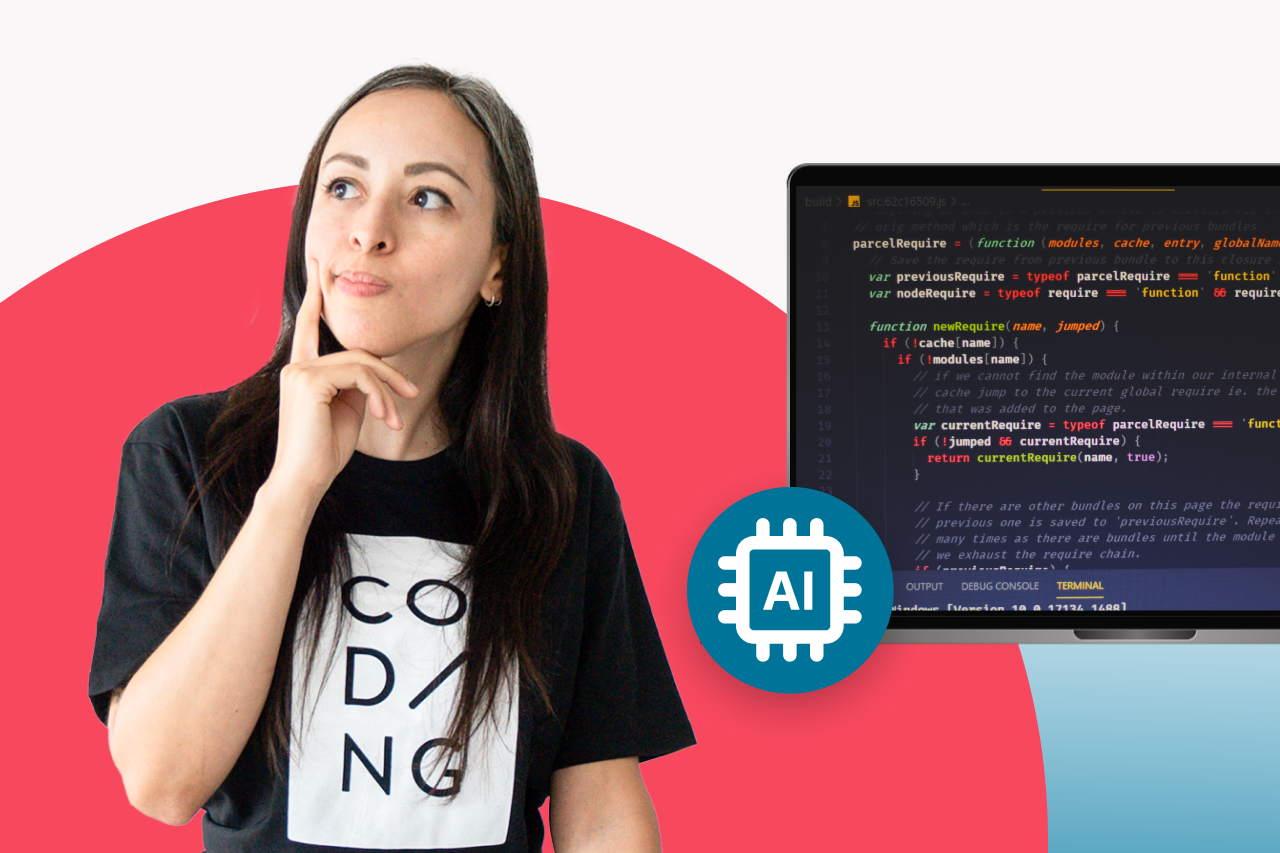A spectre is haunting web development. It is the spectre of artificial intelligence (AI), which many believe will replace web developers wholesale, along with several other types of professionals.
For the old-timers of this field, this may well feel like familiar ground. Developers used to worry that they would be out of a job when Homestead, an early automated website builder, was launched in June 1998 – and that was less than ten years after the World Wide Web was invented.
The same story repeated itself, at various intervals in time, with the release of other no-code website builders (WordPress, Wix, Bubble, Webflow).
Now it’s the turn of AI, as large language models become capable of writing their own code and even building whole websites from scratch. How will this new tool fare, in the apparently age-old campaign to drive web developers extinct?

What Can AI Do In Web Development?
AI’s capabilities within the realm of web development are certainly expanding. There are three types of tasks that it is particularly well-suited to accomplish, and which are currently the prerogative of web developers.
1. Writing Code
AI’s effectiveness in writing code, be it on ChatGPT or through GitHub’s Copilot, has improved dramatically and is probably the main reason why developers are concerned.
AI is certainly capable of producing enormous amounts of viable code in very short times. At the moment, however, it excels mostly in writing code snippets.
More complex tasks which require a ‘general overview’ of a problem are still very challenging for AI models to resolve. A recent study showed GPT-4, the most advanced LLM out there, being capable of solving only 1.7% of the real-world GitHub problems it was fed.
2. Tasks based on pre-existing templates
Templates to build websites are very common nowadays, and jobs that involve templates are exactly the kind of thing that AI excels at. Give an AI a sequence of consistent instructions and ask it to ‘follow the dotted line’, and you’ll usually get roughly (sometimes even exactly) what you were looking for.
Unsurprisingly, website-building platforms like Wix (which use templates) have been among the first to integrate AI models into their services. Expect templates and AI to increasingly go hand in hand in the future.
3. Testing and Maintenance
AI has assumed several new roles in testing and maintenance. AI-driven tools can detect issues on websites when they appear and provide a quick fix.
The most useful testing functions of AI, however, are not so much those that replace web developers as much as those that assist them. Real-time testing tools like Codiga allow developers to identify issues in their code even as they write it, which naturally has the effect of boosting productivity (and greatly reducing frustration!).

What Is The Future For Web Developers?
At the moment, the most likely development is not that AI will kill web development – but that it will push it towards two evolved roles, which we may refer to as the hybrid web developer and the specialist web developer. Let’s look at some of the jobs that they could be doing (keeping the discussion very general, as we cannot predict the exact job titles that will come up!).
Hybrid Web Development Roles
a) Integrating user experience into website design
In this role, developers will continue to do their work of website building, but because this process is now greatly simplified and expedited by AI, they will simultaneously take on tasks typically associated with UX designers. They will therefore need to understand user behaviour, basic design principles, and accessibility standards to create engaging and effective user interfaces.
This goes the other way round too, by the way – it seems likely that UX designers of the future will pick up more website-building skills, as these become more accessible thanks to AI.
b) Management or supervision of complex projects
Though perhaps not technically a ‘hybrid role’, project management is the sort of thing that will always challenge an LLM, as it requires a broad understanding of multiple concurrent tasks – something which algorithms are unfit to develop.
This role requires competence in web development itself, but also organisational skills, leadership, and an understanding of project management methodologies.
Specialist Web Development Roles
a) Using and implementing new technologies
AI can only be trained on existing data from the past, which means it is inherently unfit to work with a technology that has just been released. And if you have any experience in the field, you already know that new technologies appear in web development every year. Indeed, AI itself is an example of such new tech.
Anything that represents a methodological novelty – be it in the form of cutting-edge frameworks, programming languages, or emerging web standards – will require specialists to be managed, and future jobs in web development are likely to involve these things.
b) Integrating AI itself into web development
AI may be great at performing some tasks in web development, but in order to do that, it needs to be implemented and integrated into an existing project. For anything but the most basic type of work, this will require a deep understanding of the relevant AI tools.
Enter the web developer specialised in AI, who not only understands the technical aspects but can also strategically implement these technologies to enhance web development processes. The more AI takes over web development, the more these professionals will be in demand – representing a perfect example of AI creating new jobs rather than replacing old ones.

AI As Part Of Web Development’s Natural Cycle
The reason web developers in past times were already afraid their job would go extinct is very simple: it’s because web development is changing all the time.
Correspondingly, almost all technical skills that a web developer will learn in the first year of their career will become obsolete by the time they retire.
If you’d like to become a web developer and you are worried that the tools you’ll start learning now will be useless ten years down the line, well – you are probably right! But that’s not because of AI, or at least not because AI is qualitatively different from all other technologies that have rocked the field since its inception. It’s because this is what it means to work in tech. For everyone.
As we have shown above, there will certainly be a demand for experts qualified in web development, albeit in evolved roles compared to those of today. But one thing is certain – the only way to be among those experts tomorrow is to start learning the basics today. You cannot review code written in JavaScript by an AI, if you do not understand JavaScript yourself.
The good news is that among the many things that AI can do, it can help you learn web development. Lean into AI tools right from the start, find out how to use them, and you’ll not only learn at a faster rate – you will be investing in your career, right from the beginning.
The emergence of AI is, by any standard, a development consistent with the short history of web development itself. The field changes face every year, and now – as in the past – those who dig their heels in and refuse to grow will flounder, but those who keep learning and stay in step with the times will flourish.






